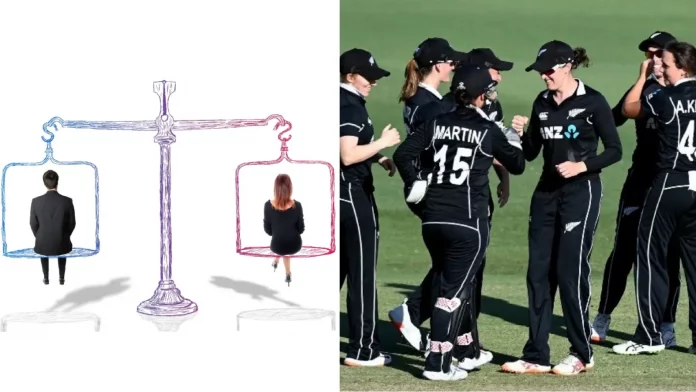New Zealand’s women’s cricketers will be paid the same as their male counterparts after a “landmark agreement” was reached to close the gender pay gap across all formats and competitions in cricket. From 1 August, the women’s national team and domestic women’s players will receive the same match fees as men. This is a part of a five-year deal struck between New Zealand Cricket, the six major associations and the players’ union.
NZC and the six Major Associations worked towards a pay equity framework with the advice of gender pay expert, Yolanda Beattie. The improved pay and conditions are part of an agreement calculated on the country’s men’s and women’s professional players receiving 29.75% of all NZC forecast revenue over five years ($349m), expected to amount to $104m.
Also Read: MS Dhoni Educational Qualification: How Was MS Dhoni in Studies?
Men’s team will still earn more than Women’s team
Equal pay will mean the highest-ranked White Ferns player will now receive up to $163,246 a year from the present $83,432. While the top-ranked women’s domestic players would be able to receive up to $19,146 from the present $3,423.
While the men’s national team players will be paid the same match fees for T20I and ODI matches as the women, they are still likely to earn more. This is because of the higher number of matches played, formats contested and time spent training and playing. That means top Black Caps players can earn up to $523,396. While high-ranking domestic men’s players would be in line to receive a maximum of $102,707.
“It’s great for the international and domestic women players to be recognised in the same agreement, alongside the men. It’s a massive step forward and will be a huge drawcard for young women and girls.”
White Ferns captain Sophie Devine said the agreement was a game-changer for women’s cricket.
Check Out: West Indies legend Shivnarine Chanderpaul named as USA Women’s team head coach
Kane Williamson says this decision would secure the future of the game in New Zealand
This deal also sees an increase from 54 to 72 total number of women domestic contracts. But will restrict the players to retain other employment or study commitments. There is also an increase in annual contracts from nine to twelve per team. Moreover, it also seeks to ensure women cricketers are equal with men in terms of travel and accommodation. With the wider playing and training environment of similar standards. Additionally, Pregnancy and childcare provisions contained in the existing agreements have been retained.
“It’s really important for the current players to build on the legacy of those who have gone before us, and to support tomorrow’s players, both men and women, at all levels,” he said. “This agreement goes a long way towards achieving that.”
New Zealand Men’s team captain Kane Williamson

